Yesterday I read a children's picture book that took me right back to the nine months I spent in Prague, Czech Republic.
Peter Sis, a Czechoslovak immigrant to America in the 1980s, wrote about what it was like to be born at the start of the Communist regime and grow up in a totalitarian system.
When I lived in Prague, I had listened with extraordinary intent to Czech friends who had gone through this history. I loved hearing their experiences, their wisdom from what they had been through, and learning from them how people and families cope with a dystopian reality.
Peter Sis has compressed his own history and his nations' history into this graphical history that can be read in less than an hour. He bore witness! He warned! It's as if he is handing the reader at home the conversations we expats got to have in Prague with our Czech friends about what it was like.
I can't recommend the book enough. It would make a wonderful book to read together as a family for an intergenerational discussion about freedom.
This book has been widely acclaimed both as a Caldecott Honor book for distinguished illustration (the author's wonderful drawings help tell the story), and as the winner of the Siebert award for the most distinguished informational title in America, for children, in the year it was published.
Here is a short interview with the author.
From "The Wall: Growing Up Behind the Iron Curtain"
“When my American family goes to visit my Czech family in the colorful city of Prague, it is hard to convince them it was ever a dark place full of fear, suspicion, and lies. I find it difficult to explain my childhood; it’s hard to put it into words, and since I have always drawn everything, I have tried to draw my life— before America—for them.” —Peter Sis
You may be interested in these other reads:
The Restoration of Order: The Normalization of Czechoslovakia" by Milan Simecka
How We Survived Communism and Even Laughed by Slavenka Drakulic
In Prague, You Can Enjoy Reading "Café Europa" at the Café Europa
WWII was worse for Central Europe than even our histories and memories tell us
Heda Kovaly, Czech Who Wrote of Totalitarianism, Is Dead at 91
Understanding Iran: The Power of One Graphic Novel named "Persepolis"
The 'Empty Nest Expat' blog is on Facebook! Follow my adventures there.
Showing posts with label Iron Curtain. Show all posts
Showing posts with label Iron Curtain. Show all posts
Wednesday, November 20, 2013
Thursday, December 30, 2010
Does the World Need the Opposite of a Nobel Peace Prize?
Do you remember when Ronald Reagan first declared the totalitarian Soviet Union an "evil empire?" Many citizens in the Soviet Union cite that moment as the one that caused them to really think about and question their own system.
"How could that be?" I wondered, "Everyone could see it was evil, why couldn't the people who actually live there? Why would it take an American President to make them stop and question something that was so obviously not working for participants and outsiders alike?"
Reagan said:
If people get delusional, it makes sense that countries and societies can get delusional too. They are just a giant collection of individual people. Indeed, there are delightful books written about economic self-delusion such as Tulipmania: The Story of the World's Most Coveted Flower & the Extraordinary Passions It Aroused. Another well-known form of personal delusion is addiction as described in the fiction bestseller A Million Little Pieces.
What could some national delusions be? How about:
Colonization?
Debt loads?
Empire?
Ethnic cleansing (World War II Germany and the Balkans and Rwanda more recently)?
Environmental degradation?
Hatred? (Middle Eastern attitudes toward Jewish People and European attitudes toward Roma)?
Extreme Paranoia and Societal Militarization (North Korea)?
Extreme Paranoia and Thugocracy? (Iran)
Nationalization of Property? (Soviet Union)
Non-Acceptance of Election Results? (Ivory Coast)
Extraordinary Corruption? (Afghanistan)
Extraordinary Use of Resources (United Arab Emirates and the United States)
Censorship and Lack of Free Expression (China)
What if someone with more credibility and less baggage than President Bush, a disinterested organization with a track record of caring, credibility, and leadership toward uplifting humanity gave the national equivalent of a 12-step intervention to a nation? A diplomatic call to "snap out of it!"
I propose that such a yearly intervention exist. Coming from the Nobel Committee, this yearly-awarded challenge could go to the country most needing a loving intervention and reminder that your fellow humans wish the best for you and think you can and should do better.
In order to let a nation know it needs to change, this intervention could be labeled not the Nobel Prize, but the Nobel Challenge. The Nobel Challenge would be the very classy national equivalent of friends and family sending an addict to rehab. Detox, please!
Even if countries go behind "an iron curtain," if the citizens have known about the prize beforehand and find out that their country has won the award, it becomes a kind of shorthand meaning "look long and hard at the direction your nation is headed. We, orignators of the award, "challenge" you because we think your nation is the one potentially endangering the peace of the world. It forces debate among citizens that can't be so easily dismissed and ignored.
The Nobel Challenge could be the sort of thing that seeps change into a country at the grassroots level. How can any one story in the media reach the North Korean people and give them the message "the entire world thinks you need a change." For all I know, the North Korean people know that better than we do. But do all the people of Iran? What seeps into the minds of the oppressed at the grass roots level? One big call to action might not only bring people to discuss change, but be empowered to create change.
Here's another example from my own culture where a society fails to recognize its own delusion. There were recently stories in the news that America and the United Arab Emirates consume electricity and water in huge quantities. The United Arab Emirates used four times as much water as Europe and four times as much electricity as the United States. These stories may have been noted for about 24 hours when they came out but most citizens of those countries would just yawn in indifference.What if the world, in the form of the Nobel Committee, said through the Nobel Challenge, "your use of resources is unsustainable, please change, your behaviour could create potential conflicts." First, my country would have a hissy fit, then we would get down to business and exceed whatever benchmark was given for change.
So how can humanity create change rather than yawning indifference to a long-term story? Think instead how the announcement of a Nobel Prize is treated. The tradition is institutionalized so journalists are prepared for the announcement and make sure to cover it in a significant way. It's a tradition that is highly anticipated around the world. It has a track record that people can discuss and debate. It has a meaning deeper than one particular year or person or organization. Instantly, when a Nobel Prize is announced, book clubs around the world read the works written by the author cited in the literature prize, for example, and think about the author's ideas and discuss what has been held up to the light by the prize.
Why even a totalitarian nation might have a hard time keeping that news from it's people no matter how hard it tried. It would be the equivalent of when an addict is confronted by all their family and all of their coworkers and the ability to "excuse" is stripped away. I recognize that defiance (one of the central hallmarks of an addict), may be the outcome of a dictator being challenged in this way, but the world has to shut him down sometime.
In George Orwell's "Animal Farm," it's when the pigs take the milk and apples from the other animals and the other animals notice and don't say anything that the abuse of power continues and increases. Orwell calls it the turning point of the story. When Chamberlain appeased Hitler with Czechoslovakia, same thing. Indeed, an ignored Nobel Challenge to someone like Saddam for the way he treated his citizens might have given George Bush some legitimacy for later intervention (I can't believe I just said that, I didn't believe in that military intervention one whit).
As the history of the Nobel Challenge built up, it might begin to have a preemptive performance effect before it is even given. Jack Welch, the CEO of GE chosen by Fortune Magazine as the "Manager of the Century", was famous for the performance he got out of his company (when he took over as CEO, revenues were $26.8 billion - when he left they were $130 billion). He had a rule that he would eliminate the bottom 10% of nonperforming staff every year. Can you imagine how extremely motivating it must have been to people to not be in that bottom 10%? Can you imagine how motivating it would be to not have your country ever receive a Nobel Challenge? It sounds cruel, but actual conflicts are crueler. Just read my previous blog post for a reminder.
All managers of any sort of human enterprise know that there is an entire emotional cycle to implementing change with all kinds of foot-dragging and noise by those who hate changing. The Nobel Challenge could be helpful in prodding those who love the status quo because it's the "devil they know." The world may have to absorb change at an even faster pace in the future.
If our species doesn't find a way to challenge the ever-expanding global abuses of power in a cost-effective, non-military way, could it be the turning point in our story?
"How could that be?" I wondered, "Everyone could see it was evil, why couldn't the people who actually live there? Why would it take an American President to make them stop and question something that was so obviously not working for participants and outsiders alike?"
Reagan said:
...I urge you to beware the temptation of pride, the temptation of blithely declaring yourselves above it all and label both sides equally at fault, to ignore the facts of history and the aggressive impulses of an evil empire, to simply call the arms race a giant misunderstanding and thereby remove yourself from the struggle between right and wrong and good and evil.President Bush tried to create the same effect of waking foreign citizens out of their denial by demanding Iran, Iraq, and North Korea end their "axis of evil." Unfortunately, President Bush seemed to be in his own self-delusion regarding weapons of mass destruction in Iraq at the time so it didn't quite have the intended effect. And it also didn't accurately reflect those three nations diplomatic actions. They weren't in a tri-part pact.
If people get delusional, it makes sense that countries and societies can get delusional too. They are just a giant collection of individual people. Indeed, there are delightful books written about economic self-delusion such as Tulipmania: The Story of the World's Most Coveted Flower & the Extraordinary Passions It Aroused. Another well-known form of personal delusion is addiction as described in the fiction bestseller A Million Little Pieces.
What could some national delusions be? How about:
Colonization?
Debt loads?
Empire?
Ethnic cleansing (World War II Germany and the Balkans and Rwanda more recently)?
Environmental degradation?
Hatred? (Middle Eastern attitudes toward Jewish People and European attitudes toward Roma)?
Extreme Paranoia and Societal Militarization (North Korea)?
Extreme Paranoia and Thugocracy? (Iran)
Nationalization of Property? (Soviet Union)
Non-Acceptance of Election Results? (Ivory Coast)
Extraordinary Corruption? (Afghanistan)
Extraordinary Use of Resources (United Arab Emirates and the United States)
Censorship and Lack of Free Expression (China)
What if someone with more credibility and less baggage than President Bush, a disinterested organization with a track record of caring, credibility, and leadership toward uplifting humanity gave the national equivalent of a 12-step intervention to a nation? A diplomatic call to "snap out of it!"
I propose that such a yearly intervention exist. Coming from the Nobel Committee, this yearly-awarded challenge could go to the country most needing a loving intervention and reminder that your fellow humans wish the best for you and think you can and should do better.
In order to let a nation know it needs to change, this intervention could be labeled not the Nobel Prize, but the Nobel Challenge. The Nobel Challenge would be the very classy national equivalent of friends and family sending an addict to rehab. Detox, please!
Even if countries go behind "an iron curtain," if the citizens have known about the prize beforehand and find out that their country has won the award, it becomes a kind of shorthand meaning "look long and hard at the direction your nation is headed. We, orignators of the award, "challenge" you because we think your nation is the one potentially endangering the peace of the world. It forces debate among citizens that can't be so easily dismissed and ignored.
The Nobel Challenge could be the sort of thing that seeps change into a country at the grassroots level. How can any one story in the media reach the North Korean people and give them the message "the entire world thinks you need a change." For all I know, the North Korean people know that better than we do. But do all the people of Iran? What seeps into the minds of the oppressed at the grass roots level? One big call to action might not only bring people to discuss change, but be empowered to create change.
Here's another example from my own culture where a society fails to recognize its own delusion. There were recently stories in the news that America and the United Arab Emirates consume electricity and water in huge quantities. The United Arab Emirates used four times as much water as Europe and four times as much electricity as the United States. These stories may have been noted for about 24 hours when they came out but most citizens of those countries would just yawn in indifference.What if the world, in the form of the Nobel Committee, said through the Nobel Challenge, "your use of resources is unsustainable, please change, your behaviour could create potential conflicts." First, my country would have a hissy fit, then we would get down to business and exceed whatever benchmark was given for change.
So how can humanity create change rather than yawning indifference to a long-term story? Think instead how the announcement of a Nobel Prize is treated. The tradition is institutionalized so journalists are prepared for the announcement and make sure to cover it in a significant way. It's a tradition that is highly anticipated around the world. It has a track record that people can discuss and debate. It has a meaning deeper than one particular year or person or organization. Instantly, when a Nobel Prize is announced, book clubs around the world read the works written by the author cited in the literature prize, for example, and think about the author's ideas and discuss what has been held up to the light by the prize.
Why even a totalitarian nation might have a hard time keeping that news from it's people no matter how hard it tried. It would be the equivalent of when an addict is confronted by all their family and all of their coworkers and the ability to "excuse" is stripped away. I recognize that defiance (one of the central hallmarks of an addict), may be the outcome of a dictator being challenged in this way, but the world has to shut him down sometime.
In George Orwell's "Animal Farm," it's when the pigs take the milk and apples from the other animals and the other animals notice and don't say anything that the abuse of power continues and increases. Orwell calls it the turning point of the story. When Chamberlain appeased Hitler with Czechoslovakia, same thing. Indeed, an ignored Nobel Challenge to someone like Saddam for the way he treated his citizens might have given George Bush some legitimacy for later intervention (I can't believe I just said that, I didn't believe in that military intervention one whit).
As the history of the Nobel Challenge built up, it might begin to have a preemptive performance effect before it is even given. Jack Welch, the CEO of GE chosen by Fortune Magazine as the "Manager of the Century", was famous for the performance he got out of his company (when he took over as CEO, revenues were $26.8 billion - when he left they were $130 billion). He had a rule that he would eliminate the bottom 10% of nonperforming staff every year. Can you imagine how extremely motivating it must have been to people to not be in that bottom 10%? Can you imagine how motivating it would be to not have your country ever receive a Nobel Challenge? It sounds cruel, but actual conflicts are crueler. Just read my previous blog post for a reminder.
All managers of any sort of human enterprise know that there is an entire emotional cycle to implementing change with all kinds of foot-dragging and noise by those who hate changing. The Nobel Challenge could be helpful in prodding those who love the status quo because it's the "devil they know." The world may have to absorb change at an even faster pace in the future.
If our species doesn't find a way to challenge the ever-expanding global abuses of power in a cost-effective, non-military way, could it be the turning point in our story?
Monday, November 9, 2009
Remembering the Fall of the Berlin Wall

When the fall of the Berlin Wall happened, I remembered being 100% glued to my television set. I was 30 years old at the time. Old enough to have never known anything but the Berlin Wall dividing Eastern and Western Europe. It had become so institutionalized, so flat out hulking, ugly and immovable, it would never have occurred to me that it could go away. It just was. The Soviets were a great power like America and weren't going anywhere. That wall was there for good.
By 30, I had seen millions of Americans willing to pay acres and acres of tax dollars they had worked hard for to prevent a "domino effect" of further communist states without question because once a state had gone red, it had entered a static non-changeable state. It just seemed like things wouldn't and couldn't change.
The lesson I take away from the Berlin Wall is that anything is possible. Indefensible ideas fall. The most hopelessly sclerotic ideology gets abandoned cause it's just too exhausting to defend the indefensible. Communism couldn't escape the marketplace of ideas. There are a whole host of things happening today in the world that may solve themselves, because eventually, people just get tired of defending the indefensible.
Labels:
architecture,
Berlin Wall,
communism,
Germany,
Iron Curtain
Saturday, April 18, 2009
"We are here because enough people ignored the voices who told them that the world could not change!"
 What's Latin for "they came, they saw, they charmed?" That's what President and Mrs. Obama did when he spoke to the Czech people on April 5th, 2009 on a hazy Sunday morning at Hradcany Namesti (Prague Castle Square).
What's Latin for "they came, they saw, they charmed?" That's what President and Mrs. Obama did when he spoke to the Czech people on April 5th, 2009 on a hazy Sunday morning at Hradcany Namesti (Prague Castle Square).Beginning with Czech history from Chicago (something well-known to Czech people and hardly known outside of Chicago within America), President Obama shared his Chicago roots in a way that charmed the Czechs and Americans like me in the audience. He honored Czech people for things they love about themselves and by extension, that Czechs teach foreigners to love about them as well: their humor, their high level of culture, their "unconquerable spirit despite empires rising and falling, and the "revolutions ... led in arts and sciences, politics, and poetry. "
My very favorite part of the speech was one I did not expect. When he was establishing connection with his Czech audience, President Obama talked about the improbability of him serving the United States as President and of Czech people being free to live their lives in democracy:
"We are here today because enough people ignored the voices who told them that the world could not change."
 What a perfect thing to say to a nation of skeptics who don't believe that democracy will change anything, who don't believe that corruption can ever end, and that don't believe their politicians will stop arguing and start governing. President Obama was asking Czechs to believe. It was easily the most moving part of his speech.
What a perfect thing to say to a nation of skeptics who don't believe that democracy will change anything, who don't believe that corruption can ever end, and that don't believe their politicians will stop arguing and start governing. President Obama was asking Czechs to believe. It was easily the most moving part of his speech.He was asking them to recognize their own power as citizens and visionaries if they organize and work for and believe in change. After all, it was their first democratically-elected President, President Vaclav Havel, who proved that "moral leadership is more important than any weapon." Believe, Czech people, believe!
He did not come here to argue the merits of the proposed missile defense system to the Czech people. He aimed much bigger than that. He came to propose a nuclear-free world. Now if any other politician proposed such a thing in a speech, I have to admit, I would roll my eyes that he expected me to believe such a Pollyanna vision is possible. But if there is anything I have learned about my President is that he accomplishes things that others might not even dream up. This is a man who had his credit card denied trying to get into the Democratic convention in 2000 in Los Angelas just so he could attend and eight years later was the nominee of his party. I'm not discounting the possibility that he could actually do it.
He broke the whole idea of eliminating nuclear weapons down to manageable short-term goals, any one of which would be an accomplishment in it's own right. Godspeed, Mr. President.
He even labeled the Czech Republic as a being in the heart of Central Europe, not Eastern Europe! Americans labelling the Czech Republic as "Eastern Europe" drives Czech people crazy. We Yanks can't help it, we still have that Iron Curtain line in our heads. When I talk to Czech friends my age, I realize they do too. It is a new generation, born in freedom, that has a new reality. Major charm points, President Obama. Thanks for coming to the Czech Republic!
There are great photos of President and Mrs. Obama in Prague on the White House blog dated April 9, 2009 at http://www.whitehouse.gov/blog.
Thursday, October 9, 2008
"An Iron Curtain has descended"
Driving through Missouri is a pleasure because the glaciers did not make it down this far from the North to flatten the earth. All the county roads are hilly and curvy. Walt, my Couchsurfing host, told me about a terrific one, Road WW, that I should use to arrive at my next destination. I felt like I was in a car commercial, such was the pleasure of the drive!
Just 30 miles from Columbia, Missouri, where daughter #2 goes to university, is the charming small town of Fulton, Missouri. It looks like the kind of community that would be terrific for raising children. It's small enough to be safe for riding bikes all over town but with intellectual stimulation for the community from the local college.
It was here that the local institution of higher learning, Westminster College, took advantage of having a Missouri native son in the White House, to see if they could finagle Winston Churchill as a speaker for their annual address on international relations. President Harry Truman wrote a handwritten note on the bottom of the invitation telling Mr. Churchill that he would introduce him. Winston promptly accepted.
In 1946, in this small town in Fulton, Missouri, Winston Churchill named and described what was happening to Eastern and Central Europe after WWII. It was forever to be known as the "Iron Curtain" speech.
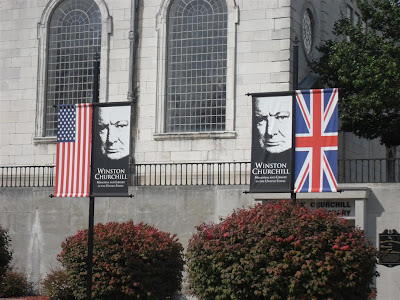


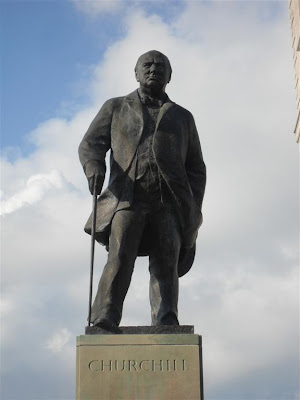
 This is the actual hard copy of Winston Churchill's speech describing "the iron curtain" that had descended over the ancient capitals of Central and Eastern Europe. It's impossible for me to look at the page without reading it mentally in my best Winston Churchill imitation. How about you?
This is the actual hard copy of Winston Churchill's speech describing "the iron curtain" that had descended over the ancient capitals of Central and Eastern Europe. It's impossible for me to look at the page without reading it mentally in my best Winston Churchill imitation. How about you?
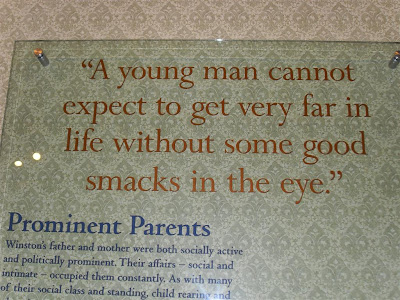 Winston Churchill's life experience is shared through the exhibits. A recurring theme is the ability to foresee what would happen before others could.
Winston Churchill's life experience is shared through the exhibits. A recurring theme is the ability to foresee what would happen before others could.
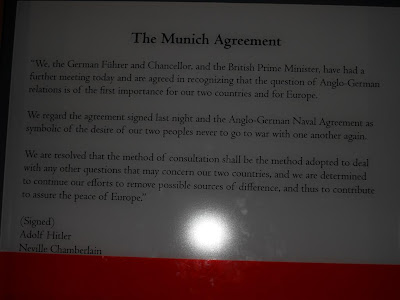
The exhibit makes the point again and again that no Czech was present
when the Munich agreement was negotiated
between Neville Chamberlain and Adolf Hitler.
Which immediately begs the question: what if one had been?
Would the outcome have been different?
Or would that poor Czech and his descendants have had to live with that?
What do you think?
It goes without saying, but I will say it anyway --
this was not the West's finest hour.

To commemorate this important speech, Westminster College administration and trustees, pursued importing and reassembling an English church designed by the great Christopher Wren to memorialize the wisdom of Winston Churchill. There were so many churches damaged in the Blitz that the English could not restore them all and were happy to let this one go.
The stones, while marked, became all jumbled when they were used as ballast in the ship's hold coming over (using them as ballast lowered the shipping cost). Then they were jumbled a second time when they were transported across country. Walt's uncle was the lead stone mason on the project. He had the job of puzzling which stone went where.

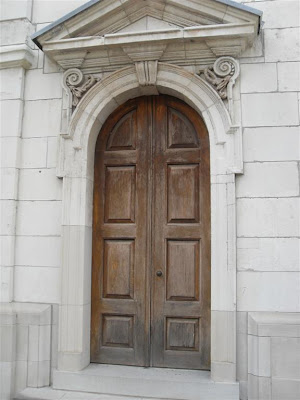
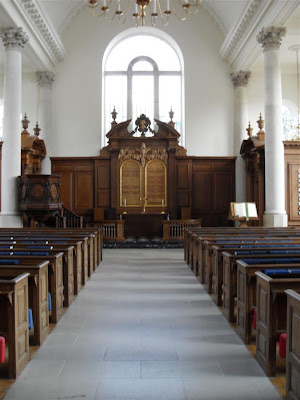
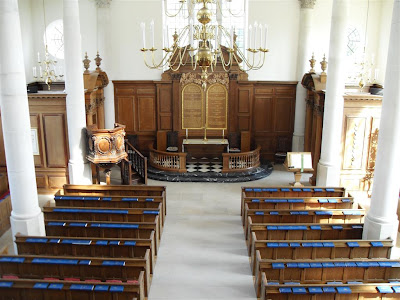
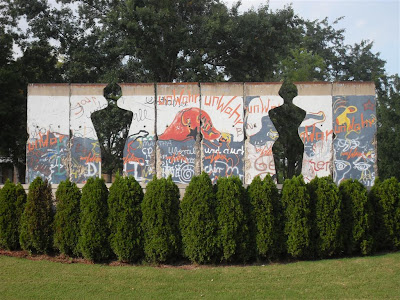
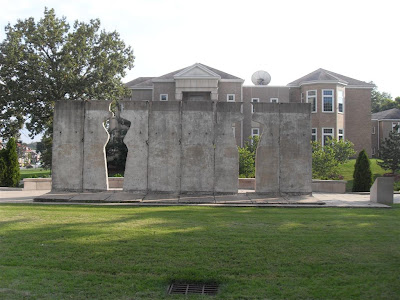
Just 30 miles from Columbia, Missouri, where daughter #2 goes to university, is the charming small town of Fulton, Missouri. It looks like the kind of community that would be terrific for raising children. It's small enough to be safe for riding bikes all over town but with intellectual stimulation for the community from the local college.
It was here that the local institution of higher learning, Westminster College, took advantage of having a Missouri native son in the White House, to see if they could finagle Winston Churchill as a speaker for their annual address on international relations. President Harry Truman wrote a handwritten note on the bottom of the invitation telling Mr. Churchill that he would introduce him. Winston promptly accepted.
In 1946, in this small town in Fulton, Missouri, Winston Churchill named and described what was happening to Eastern and Central Europe after WWII. It was forever to be known as the "Iron Curtain" speech.




 This is the actual hard copy of Winston Churchill's speech describing "the iron curtain" that had descended over the ancient capitals of Central and Eastern Europe. It's impossible for me to look at the page without reading it mentally in my best Winston Churchill imitation. How about you?
This is the actual hard copy of Winston Churchill's speech describing "the iron curtain" that had descended over the ancient capitals of Central and Eastern Europe. It's impossible for me to look at the page without reading it mentally in my best Winston Churchill imitation. How about you? Winston Churchill's life experience is shared through the exhibits. A recurring theme is the ability to foresee what would happen before others could.
Winston Churchill's life experience is shared through the exhibits. A recurring theme is the ability to foresee what would happen before others could.
The exhibit makes the point again and again that no Czech was present
when the Munich agreement was negotiated
between Neville Chamberlain and Adolf Hitler.
Which immediately begs the question: what if one had been?
Would the outcome have been different?
Or would that poor Czech and his descendants have had to live with that?
What do you think?
It goes without saying, but I will say it anyway --
this was not the West's finest hour.

What is that quotation?
"Those who do not remember history are condemned to repeat it."
The museum described that when Churchill assumed leadership of his country,
it was exhausted by war and broke.
He had to decide if he could afford troops on the ground in Iraq
or mere influence. He accepted reality and chose influence.
"Those who do not remember history are condemned to repeat it."
The museum described that when Churchill assumed leadership of his country,
it was exhausted by war and broke.
He had to decide if he could afford troops on the ground in Iraq
or mere influence. He accepted reality and chose influence.
To commemorate this important speech, Westminster College administration and trustees, pursued importing and reassembling an English church designed by the great Christopher Wren to memorialize the wisdom of Winston Churchill. There were so many churches damaged in the Blitz that the English could not restore them all and were happy to let this one go.
The stones, while marked, became all jumbled when they were used as ballast in the ship's hold coming over (using them as ballast lowered the shipping cost). Then they were jumbled a second time when they were transported across country. Walt's uncle was the lead stone mason on the project. He had the job of puzzling which stone went where.




Winston Churchill's granddaughter created an additional commemoration entitled "Breakthrough" utilizing a segment of the Berlin Wall.

The West German side

The East German side lacking any individual expression
Winston Churchill is my hero so I can't recommend this visit enough. I'm excited to know that I haven't read everything he has published. His writing gives me strength and inspires me.
Great leaders who have followed Winston Churchill to this site include Presidents Gerald Ford, Ronald Reagan, George H.W. Bush, British Prime Ministers Edward Heath, Margaret Thatcher, and Sir John Major, Polish President Lech Walesa, and Soviet President Mikhail Gorbachev.
Touring this site takes about three hours. Admission is $6. I would like to recommend a lively restaurant downtown with great value. A local told me about it. It's called Bek's.
Touring this site takes about three hours. Admission is $6. I would like to recommend a lively restaurant downtown with great value. A local told me about it. It's called Bek's.
Labels:
architecture,
Berlin Wall,
communism,
couchsurfing,
Iron Curtain,
Missouri,
vagabonding,
Winston Churchill,
WWII
Friday, May 2, 2008
My History with Czechs (part one)
It's very hard to know or remember now, just how forbidden and mysterious everything was behind the Iron Curtain before it fell. Americans didn't know much about the people and places involved. All the news that seemed to come from there was always produced with a "minder" in tow, so therefore suspect.
It's also hard to remember just how completely mind-blowing it was when the Berlin Wall fell. It turned out nobody in those countries believed anything their governments were spouting. I never thought I would see the fall of the Berlin Wall, never even dreamed it was possible, and when one country after another demanded change, it was incredibly moving.
No people's story was more moving than the Czechs. I remember how they would gather in Wenceslas Square and demand their freedom. Their ability to achieve all of that, with deliberate and collective non-violence was simply awe-inspiring to me. It still is. I believe 500 years from now, 1,000 years from now, future Czechs will savor that moment of themselves at their finest.
The Velvet Revolution made me want to get to know these mysterious people, and as corny as it sounds, reach out my hand in friendship. Welcome to the world! I signed up for a pen pal exchange started by a Minnesotan who was equally inspired by the new freedoms to connect. I began a correspondence with a woman in Plzen named Hana and a woman in a small town near Karlovy Vary named Lenka. We dubbed the woman near Karlovy Vary "Big Lenka" to not confuse her with Hana's daughter.
It was deeply interesting to hear about their lives and all the changes they were going through. Instantly, entrepreneurial tendencies surfaced. During communism, the lady in Pilzen's husband had worked at the giant Skoda Works. It sounded like the sort of place that would be featured prominently in a May Day poster celebrating labor -- communist heavy industry and dreary beyond belief.
Big Lenka's husband began his own business as a truck driver. He was ripped off by a business partner and it made me sad that their first experience with capitalism was one of the pitfalls. But both couples persevered. I enjoyed being the "entrepreneur cheerleader."
We invited the oldest daughter of the couple from Pilzen to come live with us for a summer to experience American life and enjoy our daughters. I truly believe we changed her life. She came to America speaking hardly any English and learned mostly from my children. At that time, Little Lenka was 15 years old.
What I think Little Lenka enjoyed learning most, and what changed her life forever, was the American idea of delaying marriage until one had first invested in oneself with college and independent single life. She asked questions about this idea constantly. All of her friends back home would be married with babies on the way by age twenty. She decided the American way of delaying marriage was better.
Talk about entrepreneurial! Little Lenka immediately sought and received a scholarship to attend an American school when she got back home. Then she sought and received scholarships from generous Czech Americans to attend university in the United States. She went to Rotary clubs all over the American Midwest to talk about the evils of communism and how great America was. No pay involved. Just gratitude. She then married an American. I'm embarrassed to say that I have lost touch with her and her family. Nonetheless, I'm proud of the role we played in changing this young woman's life.
It's also hard to remember just how completely mind-blowing it was when the Berlin Wall fell. It turned out nobody in those countries believed anything their governments were spouting. I never thought I would see the fall of the Berlin Wall, never even dreamed it was possible, and when one country after another demanded change, it was incredibly moving.
No people's story was more moving than the Czechs. I remember how they would gather in Wenceslas Square and demand their freedom. Their ability to achieve all of that, with deliberate and collective non-violence was simply awe-inspiring to me. It still is. I believe 500 years from now, 1,000 years from now, future Czechs will savor that moment of themselves at their finest.
The Velvet Revolution made me want to get to know these mysterious people, and as corny as it sounds, reach out my hand in friendship. Welcome to the world! I signed up for a pen pal exchange started by a Minnesotan who was equally inspired by the new freedoms to connect. I began a correspondence with a woman in Plzen named Hana and a woman in a small town near Karlovy Vary named Lenka. We dubbed the woman near Karlovy Vary "Big Lenka" to not confuse her with Hana's daughter.
It was deeply interesting to hear about their lives and all the changes they were going through. Instantly, entrepreneurial tendencies surfaced. During communism, the lady in Pilzen's husband had worked at the giant Skoda Works. It sounded like the sort of place that would be featured prominently in a May Day poster celebrating labor -- communist heavy industry and dreary beyond belief.
Big Lenka's husband began his own business as a truck driver. He was ripped off by a business partner and it made me sad that their first experience with capitalism was one of the pitfalls. But both couples persevered. I enjoyed being the "entrepreneur cheerleader."
We invited the oldest daughter of the couple from Pilzen to come live with us for a summer to experience American life and enjoy our daughters. I truly believe we changed her life. She came to America speaking hardly any English and learned mostly from my children. At that time, Little Lenka was 15 years old.
What I think Little Lenka enjoyed learning most, and what changed her life forever, was the American idea of delaying marriage until one had first invested in oneself with college and independent single life. She asked questions about this idea constantly. All of her friends back home would be married with babies on the way by age twenty. She decided the American way of delaying marriage was better.
Talk about entrepreneurial! Little Lenka immediately sought and received a scholarship to attend an American school when she got back home. Then she sought and received scholarships from generous Czech Americans to attend university in the United States. She went to Rotary clubs all over the American Midwest to talk about the evils of communism and how great America was. No pay involved. Just gratitude. She then married an American. I'm embarrassed to say that I have lost touch with her and her family. Nonetheless, I'm proud of the role we played in changing this young woman's life.
Labels:
Berlin Wall,
Czech people,
Hana,
Iron Curtain,
Karlovy Vary,
Little Lenka,
pen pals,
Plzen,
Velvet Revolution
Subscribe to:
Comments (Atom)













 Who links to me?
Who links to me?
